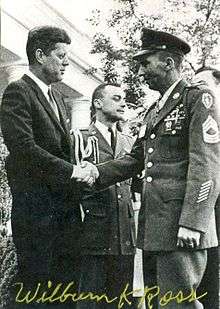Wilburn K. Ross
| Wilburn Kirby Ross | |
|---|---|
 Wilburn K. Ross (right), being congratulated by President John F. Kennedy | |
| Born |
May 12, 1922 Strunk, Kentucky |
| Allegiance | United States of America |
| Service/branch | United States Army |
| Rank | Master Sergeant |
| Unit | 2nd Battalion, 30th Infantry Regiment, 3rd Infantry Division |
| Battles/wars | World War II |
| Awards | Medal of Honor |
Wilburn Kirby Ross (born May 12, 1922) is a retired United States Army soldier and a recipient of the United States military's highest decoration—the Medal of Honor—for his actions in World War II.
Biography
Ross was born in Strunk, Kentucky. As a boy he would practice his marksmanship by placing a match in the crook of a tree and lighting it from a distance with a round from his .22 caliber rifle.[1] He started working in coal mines at age 18, but he soon joined the United States Army.[1] By October 30, 1944, he was serving as a private in Company G, 30th Infantry Regiment, 3rd Infantry Division. On that day, near Saint-Jacques, France, Ross manned a machinegun through repeated German assaults, holding off the enemy even after his supporting riflemen had run out of ammunition. During the incident, Ross noticed what he thought was the body of a deceased German soldier. This individual was in fact alive, and an American Lieutenant, who was watching Ross the entire time. This lieutenant later reported Ross' acts of valor and recommended him for the Medal of Honor[1] which was issued six months later, on April 14, 1945.
Ross reached the rank of Master Sergeant before retiring from the Army. He now lives in DuPont, Washington. The town named a community park after him and erected a memorial, on which is inscribed Ross' official Medal of Honor citation.
Medal of Honor citation
Private Ross' official Medal of Honor citation reads:
For conspicuous gallantry and intrepidity at risk of life above and beyond the call of duty near St. Jacques, France. At 11:30 a.m. on 30 October 1944, after his company had lost 55 out of 88 men in an attack on an entrenched, full-strength German company of elite mountain troops, Pvt. Ross placed his light machinegun 10 yards in advance of the foremost supporting riflemen in order to absorb the initial impact of an enemy counterattack. With machinegun and small-arms fire striking the earth near him, he fired with deadly effect on the assaulting force and repelled it. Despite the hail of automatic fire and the explosion of rifle grenades within a stone's throw of his position, he continued to man his machinegun alone, holding off 6 more German attacks. When the eighth assault was launched, most of his supporting riflemen were out of ammunition. They took positions in echelon behind Pvt. Ross and crawled up, during the attack, to extract a few rounds of ammunition from his machinegun ammunition belt. Pvt. Ross fought on virtually without assistance and, despite the fact that enemy grenadiers crawled to within 4 yards of his position in an effort to kill him with handgrenades, he again directed accurate and deadly fire on the hostile force and hurled it back. After expending his last rounds, Pvt. Ross was advised to withdraw to the company command post, together with 8 surviving riflemen, but, as more ammunition was expected, he declined to do so. The Germans launched their last all-out attack, converging their fire on Pvt. Ross in a desperate attempt to destroy the machinegun which stood between them and a decisive breakthrough. As his supporting riflemen fixed bayonets for a last-ditch stand, fresh ammunition arrived and was brought to Pvt. Ross just as the advance assault elements were about to swarm over his position. He opened murderous fire on the oncoming enemy; killed 40 and wounded 10 of the attacking force; broke the assault single-handedly, and forced the Germans to withdraw. Having killed or wounded at least 58 Germans in more than 5 hours of continuous combat and saved the remnants of his company from destruction, Pvt. Ross remained at his post that night and the following day for a total of 36 hours. His actions throughout this engagement were an inspiration to his comrades and maintained the high traditions of the military service.
See also
References
- 1 2 3 Lucas, Tim. "WWII Medal of Honor Recipient Wilburn K. Ross: His Life and Story". www.MilitaryVALoan.com. www.MilitaryVALoan.com. Retrieved 2014-01-24.
- "Full List of Living Recipients". Congressional Medal of Honor Society. Retrieved 2007-09-05.
- "Medal of Honor recipients - World War II (M-S)". Medal of Honor citations. United States Army Center of Military History. June 8, 2009. Retrieved 2007-09-05.
- "Wilburn K. Ross". Hall of Valor. Military Times. Retrieved February 10, 2012.